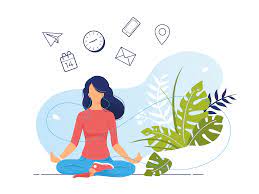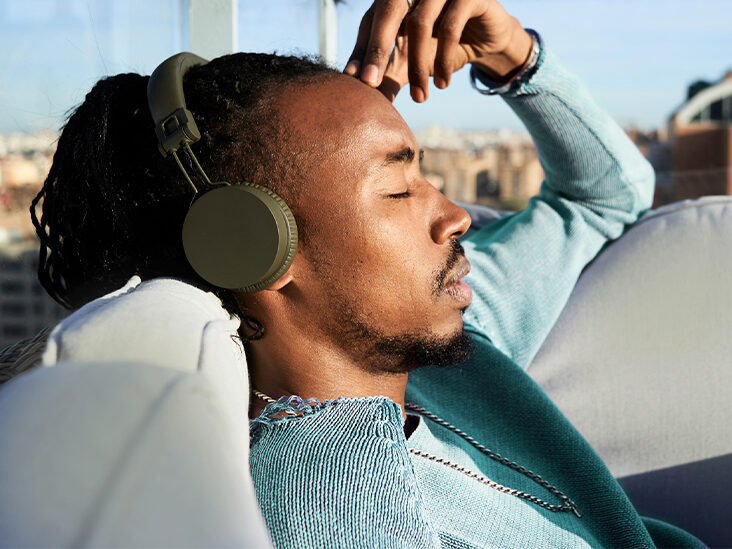Anxiety can be a crippling feeling, impacting every area of your life. From work to relationships to your overall sense of self, anxiety can make everything feel harder than it should. If you’re looking for ways to reduce anxiety and start living a more relaxed life, you’re in the right place! In this blog post, we will discuss 12 different tips and tricks that can help you manage your anxiety and live a happier life.
Defining Anxiety
 Anxiety is defined as “a feeling of worry, nervousness, or unease about something with an uncertain outcome.” Everyone experiences anxiety at some point in their lives. For some people, anxiety can be a normal and healthy reaction to stress. However, for others, anxiety can become a chronic condition that interferes with daily life.
Anxiety is defined as “a feeling of worry, nervousness, or unease about something with an uncertain outcome.” Everyone experiences anxiety at some point in their lives. For some people, anxiety can be a normal and healthy reaction to stress. However, for others, anxiety can become a chronic condition that interferes with daily life.
It is often difficult to identify the root cause of anxiety. However, there are a number of factors that can contribute to anxiety, including genetics, brain chemistry, and life experiences. And, some common symptoms include:
- feeling restless, wound-up, or on-edge
- feeling tired all the time
- having difficulty concentrating
- feeling irritable
- having muscle tension
- increased heart rate
- trembling and sweating
These feelings and thoughts interfere with daily life. And soon avoidance can make it difficult to control. And, in most cases, anxiety left untreated can get worse over time. If you’re struggling with anxiety, know that you’re not alone. There are several resources that can help you to get back your life.
While most people need psychotherapy and medication treatment to cope with their anxiety. There are some people for whom only lifestyle changes and healthy coping strategies are enough.
12 Things To Help With Anxiety
There are a lot of things to help with anxiety. Here are the top twelve:
Identify Your Triggers
In anxiety-provoking situations, it can be helpful to identify your triggers. Once you know what sets off your anxiety, you can begin to address the problem at its source. In fact, this is the primary thing that you have to focus on if you want to get rid of anxiety for good. In fact, in some types of therapies, this option is called exposure therapy.
Moreover, triggers are different for everyone, so it is important to know what yours are. For some people, it may be social situations, while others may have anxiety about work or school. If you avoid and do not take records of your triggers, you will never be able to identify them and work on them. Hence, give importance to this task as this is really important if you want to get rid of anxiety. This will help you to find out the root of your problem and work on that.
Develop a Support System
Another important thing to do when suffering from anxiety is to develop a support system. This can be comprised of family, friends, or professionals. The most important thing is that you have people you can rely on when things get tough. Because anxiety is often characterized by feelings of isolation, it’s important to have people in your life who can provide an emotional anchor.
However, it’s also important to remember that you can’t rely on others to fix your anxiety. While their support is essential, ultimately it’s up to you to manage your anxiety. So, while you should absolutely develop a support system, don’t forget that you’re the one in control.
Get Moving And Active
It is scientifically proven that exercise can help reduce anxiety. When you are anxious, your body is in a state of “fight or flight.” This means that your body is preparing for danger. Exercise helps to release the tension in your muscles and also distracts you from whatever is causing your anxiety.
Exercise is one of the most effective things you can do to combat anxiety. It helps to release endorphins, which have mood-boosting effects. Furthermore, it also reduces stress hormones, such as cortisol. As a result, exercise can help to improve your overall mood and reduce anxiety levels.
In fact, studies have shown that just 30 minutes of exercise can help to improve symptoms of anxiety. So, if you are feeling anxious, get up and go for a walk, run, or bike ride. You may be surprised at how much better you feel afterward. Just make sure that you are getting some form of physical activity every day.
Get Enough Sleep
One of the things to help with anxiety is to get a good night’s sleep. Most people need around eight hours of sleep per night. Some people may need more or less, but if you’re not getting enough sleep, it can affect your mood and make anxiety worse. In fact, researchers have found that a minimum of seven hours of sleep is essential for good mental health.
There are a few things you can do to help make sure you’re getting enough sleep:
- Stick to a regular sleep schedule as much as possible
- Create a calming bedtime routine
- Avoid working or using electronic devices in bed
Sleep is really important for reducing anxiety, so make sure you’re getting enough! However, if you find that you’re still struggling with anxiety, even after getting enough sleep, there are a few other things you can try.
Eat Healthy Diet
 Diet plays a vital role in our mental and emotional well-being. Just as eating unhealthy foods can lead to physical health problems, so too can it lead to mental health problems like anxiety. Eating a healthy diet is one of the best things you can do for your mind and body. Some specific foods that have been shown to help reduce anxiety include:
Diet plays a vital role in our mental and emotional well-being. Just as eating unhealthy foods can lead to physical health problems, so too can it lead to mental health problems like anxiety. Eating a healthy diet is one of the best things you can do for your mind and body. Some specific foods that have been shown to help reduce anxiety include:
- omega-three fatty acids
- magnesium-rich foods
- probiotic-rich foods
A healthy diet is always believed to be one of the most important factors which determine our well-being. What we eat can have a significant impact on our mood, energy levels, and overall health.
When it comes to anxiety, certain foods may help to ease symptoms while others may contribute to them. An unhealthy diet can worsen anxiety and trigger panic attacks, so it’s important to be mindful of what you eat.
Avoid Substance Abuse
Substance abuse is often a way to self-medicate when faced with overwhelming anxiety. However, this only leads to more problems down the road. Not only can substance abuse lead to addiction, but it can also make anxiety worse in the long run. If you’re struggling with anxiety, it’s important to avoid drugs and alcohol.
Moreover, caffeine can also make anxiety worse. Caffeine is a stimulant that can increase your heart rate and make you more jittery. If you’re struggling with anxiety, it’s best to cut back on caffeine or avoid it altogether. With these changes, you should start to see a reduction in your anxiety levels.
Practice Self-Relaxation Techniques
Self-relaxation techniques are usually easy to learn and can be used anywhere. They can help you feel more relaxed in general and reduce your anxiety in particular situations. Some self-relaxation techniques that may help include:
- progressive muscle relaxation
- deep breathing exercises
- visualization or guided imagery
- mindfulness meditation
More often, these techniques are most successful when you practice them regularly, even when you’re not feeling anxious. Even, this can help prevent anxiety from developing in the first place. You can also try other things, such as:
- listening to songs that make you feel good
- spending time in nature
- getting a massage
These are just a few ideas. Try out a few different techniques and see which works best for you. Moreover, relaxation techniques are considered an effective complementary treatment for anxiety disorders.
Try Stress-Management
 It is very important to manage stress in order to control anxiety. When you are feeling overwhelmed with life, take a step back and analyze what is causing your stress. From there, you can develop a plan to eliminate or reduce the source of your stress. Additionally, try some stress managing techniques such as:
It is very important to manage stress in order to control anxiety. When you are feeling overwhelmed with life, take a step back and analyze what is causing your stress. From there, you can develop a plan to eliminate or reduce the source of your stress. Additionally, try some stress managing techniques such as:
- deep breathing exercises
- yoga
- meditation
- aromatherapy
Moreover, make sure to get plenty of rest and exercise regularly, as both of these things can help reduce stress levels. In this way, you will be able to manage stress and it is actually a very effective way of reducing anxiety.
Herbal Supplements
These supplements are becoming famous for a reason. They can help with anxiety in many ways, but they are not regulated by the FDA. This means that you have to be careful about which supplements you take and how much you take. Make sure to do your research before starting any supplement regimen. However, some studies have found some effective supplements, these include:
- Lavender
- Passionflower
- Valerian Root
- Chamomile
If you are going to try herbal supplements, make sure to speak with your doctor first. Especially if you are pregnant or breastfeeding, have a medical condition or are taking medication. Herbal supplements can interact with some medications.
Keep A Journal
Journaling is widely known to be therapeutic. It allows you to get your thoughts and feelings out of your head, which can help reduce anxiety levels. In addition, it can be a way to track any patterns in your anxious thinking or behavior.
There are many different ways to journal, so find what works best for you. You can try writing stream-of-consciousness style, where you just write down whatever is on your mind without censoring yourself. Or, you can try writing in a more structured way, focusing on specific topics or questions.
Experiment and see what feels most helpful for you.
Socialization
 When you are suffering from anxiety, it is important to stay social. This can be difficult because often times your anxiety will tell you to stay home and not interact with people. However, it is important to push through this feeling and go out and see your friends or family. Staying social will help reduce your overall anxiety levels. It is essential to reduce because anxiety makes you feel isolated and alone.
When you are suffering from anxiety, it is important to stay social. This can be difficult because often times your anxiety will tell you to stay home and not interact with people. However, it is important to push through this feeling and go out and see your friends or family. Staying social will help reduce your overall anxiety levels. It is essential to reduce because anxiety makes you feel isolated and alone.
Moreover, studies have shown that socialization can help reduce anxiety. If you are feeling anxious, try reaching out to a friend or loved one. Talking to someone who understands what you are dealing with can be incredibly helpful. Because when you are feeling anxious, you often feel like you are the only one going through it. Talking to someone can help remind you that you are not alone. And, it can help you avoid isolation or loneliness.
Start Small and Be Patient
It is more about setting realistic goals and not putting too much pressure on yourself. Remember that you are trying to reduce anxiety, not get rid of it completely. That is a huge accomplishment and will take time, so be patient with the process. So, start small and break your goals down into manageable pieces.
One of the best things you can do is set aside sometime each day to focus on your mental health. This can look different for everyone, but it should be something that you look forward to and enjoy. Maybe it is taking a yoga class, reading for 20 minutes, or going for a walk outside in nature. Whatever it is, make sure that it is something that you can commit to doing regularly.
So, these are some things to help with anxiety and tips to help when you are feeling anxious. One of the best things you can do is take some deep breaths. It might seem too simple, but deep breathing helps to slow down your heart rate and relax your body. If you are not sure how to do this, there are plenty of resources online or you can ask your doctor.
Conclusion
Conclusively, the things to help with anxiety are actually very simple: be more present, breathe, get outside, and so on. But of course, there are times when you need a therapist or counselor’s advice and guidance. And that’s okay!
In fact, it is essential to seek professional help when anxiety is proving to be too much to handle on your own. But for day-to-day living, these tips and tricks should do the trick in keeping you more relaxed and less anxious. Also, don’t forget to show yourself some grace; you’re doing the best you can!
For more information, please contact MantraCare. Anxiety is a common mental health condition characterized by persistent feelings of worry, fear, and apprehension. If you have any queries regarding Online Anxiety Counseling experienced therapists at MantraCare can help: Book a trial Anxiety therapy session


